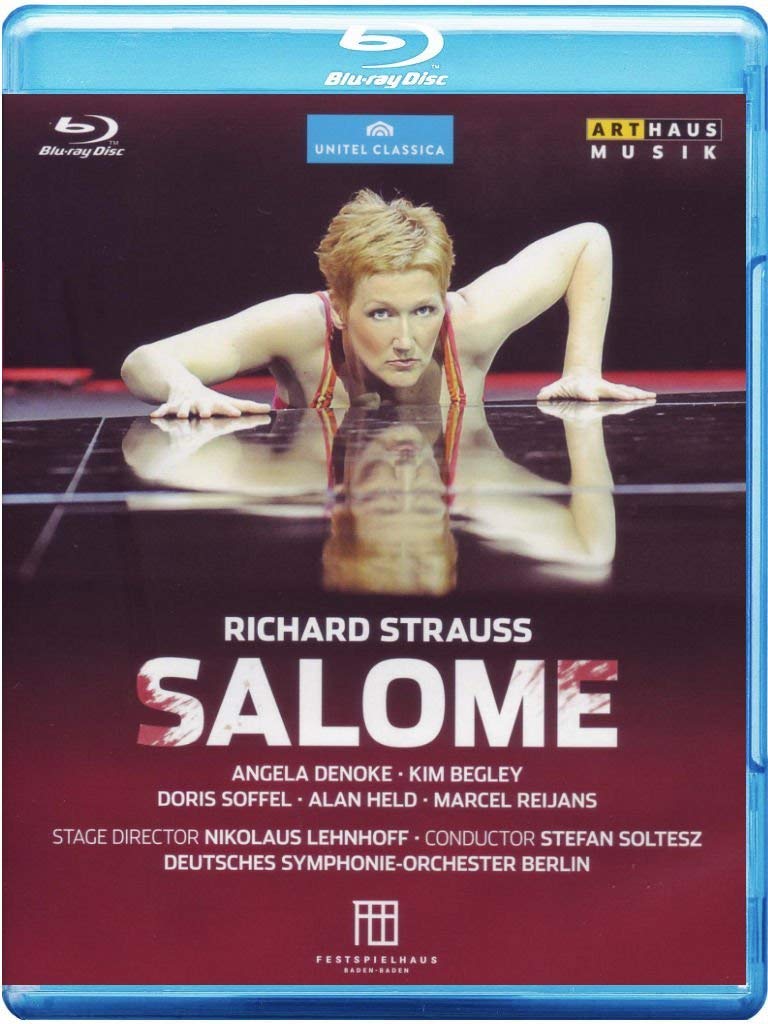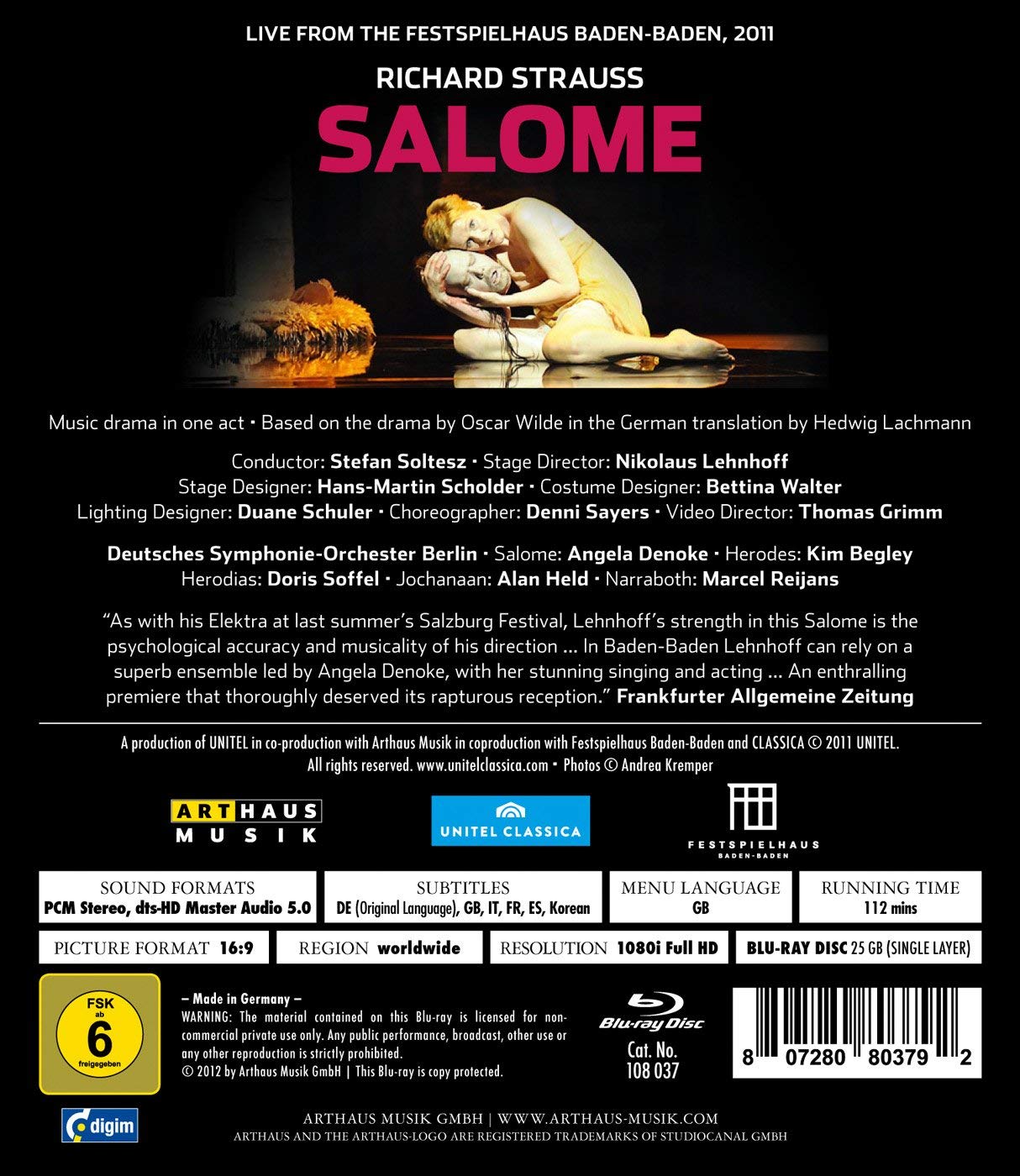

Richard Strauss Salome opera to a libretto from Hedwig Lachmann's German translation of Oscar Wilde's play Salome. Directed 2011 by Nikolaus Lehnhoff at the Festspielhaus, Baden-Baden. Stars Angela Denoke (Salome), Kim Begley (Herodes or Herod in English), Doris Soffel (Herodias), Alan Held (Jochanaan), Marcel Reijans (Narraboth), Jurgita Adamonytė (Page of Herodias), Jeffrey Francis (First Jew), Benjamin Hulett (Second Jew), Timothy Robinson (Third Jew), Pascal Pittie (Fourth Jew), Reinhard Dorn (Fifth Jew), Steven Humes (First Nazarene), Roman Grübner (Second Nazarene), David Jerusalem (First Soldier), Artur Grywatzik (Second Soldier), Iwona Sakowicz (A Page), and Patrick Büttner (Naaman the Executioner). Stefan Soltesz conducts the Berlin Deutsches Symphony-Orchestra. Stage design by Hans-Martin Scholder; costume design by Bettina Walter; lighting design by Duane Schuler; choreography by Denni Sayers. Directed for TV by Thomas Grimm. Sung in German. Released 2012, disc has 5.0 dts-HD Master Audio sound. Grade: D+
The set is placed (correctly) outside on a terrace to or backyard of Herod's palace (in sore need of repair) where Herod's servants rest while waiting for orders. Herod is having a birthday party inside with many important guests. This Baden-Baden production doesn't show the party at all, so it might be hard for a newcomer to the opera to understand why so many odd characters appear on the set from time to time. There is a pit or cistern out of sight in the center where Jochanaan (John the Baptist) is Herod's prisoner. Jochanaan hasn't committed a crime—Herod holds him in part to keep the lid on simmering religious disputes in the country and in part to silence his criticism of Herod's family. In the first screenshot below, the voice of Jochanaan can be heard saying, "When He (Jesus) comes, the blind will see the light of day."
Herod is married to Herodias, Salome's mother. Herod is Salome's step-father. Salome (Angela Denoke) leaves the party and joins the servants because Herod has been ogling her too much. She is also looking for adventure. The asks the guards, "Is this Prophet (the prisoner) a old man?"
Salome insists that the soldiers bring Jochanaan out of the pit. Salome knows that Jochanaan has accused Herodias of incest under religious law (because Herodias was previously married to Herod's brother). Here Jochanaan (Alan Held) attacks Herodias for sleeping in an "incestuous bed."
Salome would like to learn more about the Prophet's message, but seducing him would be even more fun. "Let me kiss you on the mouth."
Of course, Jochanaan spurns Salome, who then tries a different approach: "What is this Son of Man?'
Now the Prophet gets excited. What if he could baptize Salome right there in the cistern? He preaches to her:
He warmly embraces her as a potential convert:
Until Salome reveals her true intentions, "Let me kiss your mouth, John!:
John recoils in revulsion and anger. "I curse you, daughter of an incestuous mother." It seems Lehnhoff views this violently repeated cursing of Salome as the turning point of the opera. Salome is used to getting what she wants and will not be cursed with impunity. After this tongue lashing, Salome will implacably seek the same revenge her mother wants. Opportunity for this revenge will soon arise:
Now Herod (Kim Begley) moves the party out to the terrace; and, making his famous promise, he begs Salome to entertain everyone with a dance. Salome can hardly believe her good fortune and asks: "Will you really give me anything I want?"
After watching this dance, we think Herod made a bad deal indeed:
This is Denoke's last veil:
"Splendid!" declares Herod:
Herod was not that hard to please—surely Salome will not charge too much. "So what, my girl, would you like to have on the platter?"
"The repeated, implacable answer is supported also by Herodias, "I demand of you the head of John the Baptist on the platter."
"You didn't want to let me kiss your mouth."
"Well, John, now I've kissed your mouth."
Herod is terrified at how badly his party game has turned out. To appease the gods, he turns Naaman the Executioner (Patrick Büttner) loose on both members of this mother-daughter team. (The execution of Herodias is Lehnhoff's invention and is not in the libretto.)
Denoke was a highly regarded singer, a good actress and, while too old at age 50 for this role, at least thin. This opera was taken almost directly from a successful stage play, and the words are important. German is Denoke’s native German. But at her age when making this, she did not have the stamina to maintain good German diction throughout. As the opera progresses, first words and then whole phrases seem to disappear in a wallow of sound. We should point out that some of the missing words are possibly just covered up by the orchestra. But the effect is the same. Denoke is hard to understand. Alan Held has an impressive voice, but he looks like a rock musician with his strange hairdo. The balance between the singers and the orchestra is good. But the Deutsches Symphonie-Orchester Berlin is not in the big leagues, at least not in this material.
Let's move on to mis-en-scène. In 2010, the folks at Baden-Baden produced one of our favorite opera videos, a Richard Strauss Elektra with a set consisting of a solid geometric curtain, a staircase, one expensive costume (for Klytämnesta), and two props (a lamp and an axe). In 2011 they tried something similar in subject Salome with a bombed-out building, trashy costumes, and no props other a platter and a fake-looking head. But this doesn't work for Salome, where you need an atmosphere of opulent decadence throughout even though the action takes place in servant quarters. To see what we mean, just compare the screenshots of this Baden-Baden production to the screenshots in our other Salome HDVDs. Our only added comment would be to ask: Where could they have found that hideous pink dress for Salome?
We suppose one could defend the cheapness of the Baden-Baden production by observing that Lehnhoff has only a "biblical" or superficial concept of the Salome story. The princess is a spoiled brat who is angry at John because he curses her and is happy to help her mother get rid of him. If this is as far as it goes, you don't need any decadence. But we think the libretto and music supports a deeper view of Salome as sexual predator. She has already enjoyed her friends, seduced an army officer, and twisted her step-father's desire away from her mother to herself. And finally in the orgy with the head, Salome enjoys the connection (so much beloved by the Roman conquerors) between power, sex, and blood sport. She has emerged as a monster who is dangerous to everyone.
If you take the biblical view of Salome, you don't need taut personal directing of the many protagonists—it's just a tale you already know. But if you're going to create and exterminate a monster, the personal directing of every action of every character is important in building the case. When I watch the Baden-Baden disc, I feel like I'm watching a bible story.
Thomas Grimm in Baden-Baden uses a lot of close-up and extreme close-up shots. One might think this would increase the impact of the video. We now have the ability to easily make extreme close-ups in an opera, so why not provide them? Or could it be that using close-ups in an opera suggests that the show is getting boring and desperately needs something artificial to pep it up?
When you consider the other brilliant choices we have, the best grade we can give this Baden-Baden disc a D. You wouldn’t want to buy it unless there’s a special reason. If all the blood in the competition is too much for you, then you might feel edified by Lehnhoff's Bible story.
OR




















